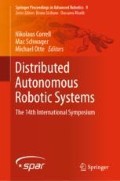Abstract
This paper presents a real-time game theoretic planning algorithm for a robotic vehicle (e.g. a drone or a car) to race competitively against multiple opponents on a racecourse. Our algorithm plans receding horizon trajectories to maximally advance the robot along the racecourse, while taking into account the opponents’ intentions and responses. We build on our previous work (Spica et al Theoretic approach to autonomous two-player drone racing, 2018 [1]), which only considered racing with two robots. Our algorithm uses an iterative best response scheme with a new sensitivity term to find approximate Nash equilibria in the space of the multiple robots’ trajectories. The sensitivity term seeks Nash equilibria that are advantageous to the ego robot. We demonstrate our approach through extensive multi-player racing simulations, where our planner exhibits rich behaviors such as blocking, overtaking, nudging or threatening, similar to what we observe from racing with human participants. Statistics also reveal that our game theoretic planner largely outperforms a baseline model predictive controller that does not consider the opponents’ responses. Experiments are conducted with four quadrotor aerial robots to validate our approach in real time and with physical robot hardware.
Access this chapter
Tax calculation will be finalised at checkout
Purchases are for personal use only
Notes
References
Spica, R., Falanga, D., Cristofalo, E., Montijano, E., Scaramuzza, D., Schwager, M.: A Game Theoretic Approach to Autonomous Two-Player Drone Racing. arXiv:1801.02302 (2018)
Nikolaidis, S., Nath, S., Procaccia, A., Srinivasa, S.: Game-theoretic modeling of human adaptation in human-robot collaboration. In: Proceedings of the 2017 ACM/IEEE International Conference on Human-Robot Interaction, pp. 323–331 (2017)
Vidal, R., Shakernia, O., Kim, J., Shim, D., Sastry, S.: Probabilistic pursuit-evasion games: theory, implementation, and experimental evaluation. IEEE Trans. Robot. Autom. 18(5), 662–669 (2002)
Zhang, Z., Zhou, L., Tokekar, P.: Strategies to design signals to spoof Kalman filter. In: American Control Conference (ACC), pp. 5837–5842 (2018)
Chen, M., Shih, J., Tomlin, C.: Multi-vehicle collision avoidance via Hamilton-Jacobi reachability and mixed integer programming. IEEE 55th Conference on Decision and Control (CDC), pp. 1695–1700 (2016)
Sadigh, D., Sastry, S., Seshia, S., Dragan, A.: Planning for autonomous cars that leverage effects on human actions. In: Robotics: Science and Systems (2016)
Liniger, A., Lygeros, J.: A Non-cooperative Game Approach to Autonomous Racing. arXiv:1712.03913 (2017)
Bhattacharyya, R., Phillips, D.P., Wulfe, B., Morton, J., Kuefler, A., Kochenderfer, M.J.: Multi-agent imitation learning for driving simulation. In: IEEE/RSJ International Conference on Intelligent Robots and Systems (IROS) (2018)
Van Den Berg, J., Guy, S., Lin, M., Manocha, D.: Reciprocal n-body collision avoidance. In: 14th International Symposium on Robotics Research, pp. 3–19 (2011)
Wang, L., Ames, A., Egerstedt, M.: Safety barrier certificates for collisions-free multirobot systems. IEEE Trans. Robot. 33(3), 661–674 (2017)
Zhou, D., Wang, Z., Bandyopadhyay, S., Schwager, M.: Fast, on-line collision avoidance for dynamic vehicles using buffered voronoi cells. IEEE Robot. Autom. Lett. 2(2), 1047–1054 (2017)
Wang, M., Wang, Z., Paudel, S., Schwager, M.: Safe distributed lane change maneuvers for multiple autonomous vehicles using buffered input cells. In: International Conference on Robotics and Automation (ICRA), pp. 4678–4684 (2018)
Tang, S., Thomas, J., Kumar, V.: Hold Or take Optimal Plan (HOOP): a quadratic programming approach to multi-robot trajectory generation. Int. J. Robot. Res. 37(9), 1062–1084 (2018)
Schmerling, E., Leung, K., Vollprecht, W., Pavone, M.: Multimodal probabilistic model-based planning for human-robot interaction. In: International Conference on Robotics and Automation (ICRA), pp. 3399–3406 (2018)
Fisac, J.F., Bajcsy, A., Herbert, S., Fridovich-Keil, D., Wang, S., Tomlin, C.J., Dragan, A.D.: Probabilistically safe robot planning with confidence-based human predictions. In: Robotics Science and Systems (RSS) (2018)
Nishimura, H., Schwager, M.: Active motion-based communication for robots with monocular vision. In: International Conference on Robotics and Automation (ICRA), pp. 2948–2955 (2018)
Boyd, S., Vandenberghe, L.: Convex Optimization. Cambridge University Press (2004)
Verschueren, R., Zanon, M., Quirynen, R., Diehl, M.: Time-optimal race car driving using an online exact Hessian based nonlinear MPC algorithm. European Control Conference (ECC), pp. 141–147 (2016)
Liniger, A., Domahidi, A., Morari, M.: Optimization-based autonomous racing of 1:43 scale RC cars. Opt. Control Appl. Methods 36(5), 628–647 (2015)
Acknowledgements
This work was supported by the Toyota Research Institute (TRI). This article solely reflects the opinions and conclusions of its authors and not TRI or any other Toyota entity. The authors are grateful for this support.
Author information
Authors and Affiliations
Corresponding author
Editor information
Editors and Affiliations
Rights and permissions
Copyright information
© 2019 Springer Nature Switzerland AG
About this paper
Cite this paper
Wang, Z., Spica, R., Schwager, M. (2019). Game Theoretic Motion Planning for Multi-robot Racing. In: Correll, N., Schwager, M., Otte, M. (eds) Distributed Autonomous Robotic Systems. Springer Proceedings in Advanced Robotics, vol 9. Springer, Cham. https://doi.org/10.1007/978-3-030-05816-6_16
Download citation
DOI: https://doi.org/10.1007/978-3-030-05816-6_16
Published:
Publisher Name: Springer, Cham
Print ISBN: 978-3-030-05815-9
Online ISBN: 978-3-030-05816-6
eBook Packages: Intelligent Technologies and RoboticsIntelligent Technologies and Robotics (R0)

